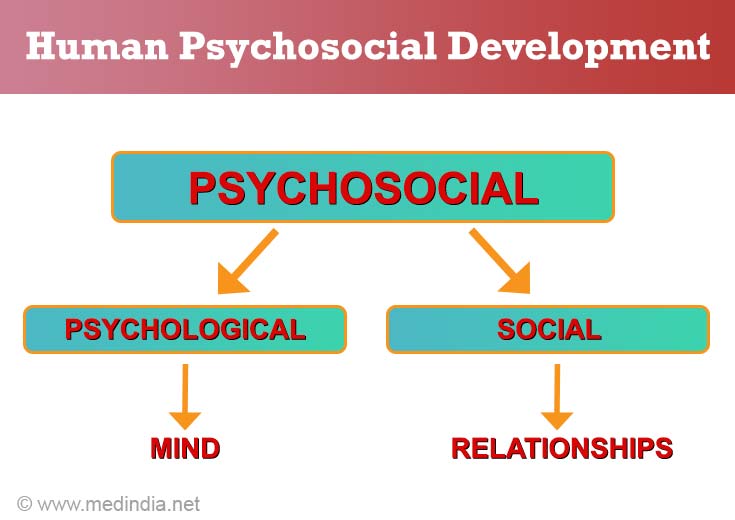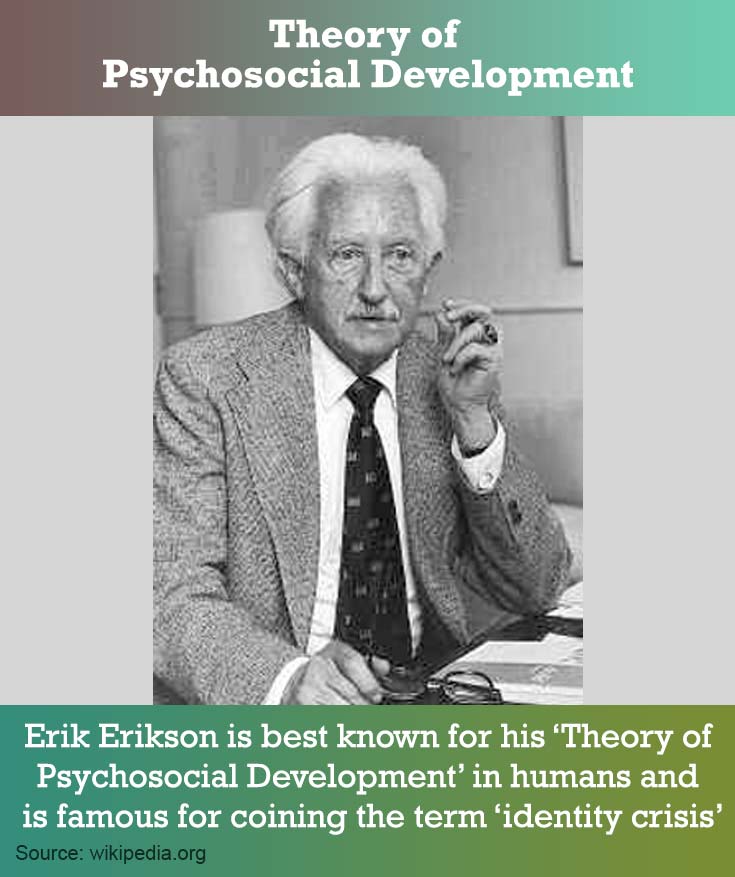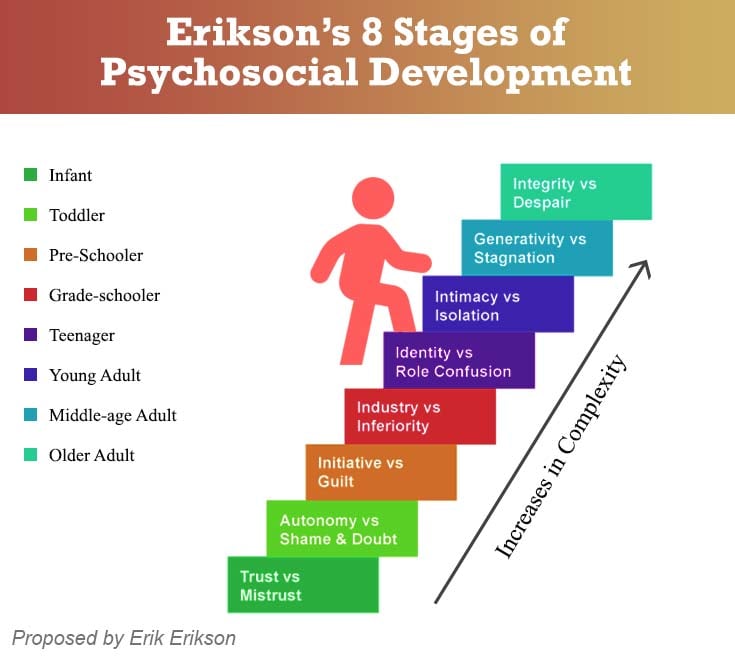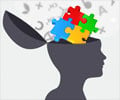- Erik Erikson - (https://en.wikipedia.org/wiki/erik_erikson)
- Erikson’s Stages of Psychosocial Development - (https://www.ncbi.nlm.nih.gov/books/nbk556096/)
- Erikson’s Stages of Psychosocial Development - (https://en.wikipedia.org/wiki/erikson%27s_stages_of_psychosocial_development)
- Erik Erikson’s Stages of Psychosocial Development - (https://www.simplypsychology.org/erik-erikson.html)
Overview
“The adolescent mind is essentially a mind or moratorium, a psychosocial stage between childhood and adulthood, and between the morality learned by the child, and the ethics to be developed by the adult” -Erik Erikson, 1963
What is Psychosocial Development?
The term ‘psychosocial’ literally means a combination of psychological and social factors that collectively influence human behavior. For example, studies have shown the relationship between an individual’s fears and apprehensions (psychological aspects) and how he behaves with others in society. This area of scientific endeavor has been extensively researched and studied by Erik Erikson, who developed a theory for human psychosocial development. This theory highlights the various crises faced by an individual and the resulting virtues gained, while passing through the various stages of life, from birth until death.

Who was Erikson?
Erik Erikson (1902-1994) was a German-American developmental psychologist and psychoanalyst. He is best known for his Theory of Psychosocial Development in humans and is famous for coining the term ‘identity crisis.’
Astonishingly, Erikson was not even a graduate but still served as a professor at world-renowned universities in the US, including Harvard, Yale, and the University of California at Berkeley. He achieved this unbelievable success by sheer hard work and erudition. Importantly, Erikson was the 12thmost cited psychologist of the 20thcentury.

What is Unique about Erikson’s Theory of Psychosocial Development?
The uniqueness of Erikson’s theory lies in the fact that he was the first to propose that human personality develops in a predetermined manner through 8 sequential stages of psychosocial development, starting from infancy and ending in old age.
Importantly, as the person passes through each stage, he experiences psychosocial crises that could positively or negatively impact personality development, depending on whether he is able to overcome the crises successfully.
What are the Stages of Erikson’s Psychosocial Development Model?
Erikson’s Theory of Psychosocial Development, which was introduced in the 1950s, is divided into 8 stages, which coincide with the age of an individual as he grows from infancy until attaining old age. This is presented in the table, which depicts the 8 stages of Erikson’s chronologically organized model.
Table: Erikson’s 8 Stages of Psychosocial Development
| Stage | Age | Psychosocial Crisis or Conflict | Virtue Developed |
| 1 | Infancy (0-1 year) | Trust vs Mistrust | Hope |
| 2 | Early Childhood (1-3 years) | Autonomy vs Shame | Will |
| 3 | Play Age (3-6 years) | Initiative vs Guilt | Purpose |
| 4 | School Age (6-12 years) | Industry vs Inferiority | Competence |
| 5 | Adolescence (12-19 years) | Identity vs Confusion | Fidelity |
| 6 | Early Adulthood (20-25 years) | Intimacy vs Isolation | Love |
| 7 | Adulthood (26-64 years) | Generativity vs Stagnation | Care |
| 8 | Old Age (65-death) | Integrity vs Despair | Wisdom |
What are the Salient Features of Erikson’s Theory of Psychosocial Development?
- Erikson’s theory is influenced by Sigmund Freud’s psychosexual theory
- Erikson laid more emphasis on culture and society
- Erikson proposed that personality development spans across the entire lifetime
- Erikson proposed that a crisis/conflict arises at each developmental stage
- The crisis/conflict identifies differences between individual and societal needs
- Successful completion of each of the 8 stages leads to a healthy personality and acquisition of virtues

What are the Strengths and Weaknesses of Erikson’s Theory of Psychosocial Development?
Like all theories, Erikson’s theory also has its strengths and weaknesses, which are briefly highlighted below:
Strengths
- Provides a solid platform for viewing the developmental stages across the entire lifespan
- Supports Aristotle’s proposal that “Man is by nature a social animal”
- Emphasizes the importance of social interactions for all-round psychological development
- Corroborated by recent research findings on identity and its different sub-stages during identity formation
Weaknesses
- Does not explain how the crises/conflicts arise but rather it forms an integral component of the theory.
- Does not explain how an individual progresses from one stage to the next
- Does not highlight the experiences required to complete each stage successfully
What are the Implications of Erikson’s Theory of Psychosocial Development?
- Inability to overcome the crises/conflicts could prevent future developmental progress, regardless of chronological age
- ‘Arrested development’ could lead to behavioral problems and adverse effects
- Could influence an individual’s maturity level and adherence to established norms
- Could help counselors and psychiatrists to recognize and respond to behavioral issues quickly
Summary
Erik Erikson modified Sigmund Freud’s psychosexual theory to produce his 8-stage theory of psychosocial development. In summary -
- At each stage of Erikson’s psychosocial development, two conflicting ideas must be successfully resolved in order to instill confidence in an individual. Failure to do so can lead to feelings of inadequacy
- Erikson’s 8 stages of psychosocial development include the following:
- Trust vs Mistrust
- Autonomy vs Shame
- Initiative vs Guilt
- Industry vs Inferiority
- Identity vs Confusion
- Intimacy vs Isolation
- Generativity vs Stagnation
- Integrity vs Despair
Erikson expanded Sigmund Freud’s stages by incorporating the cultural implications of development.
In the words of Erikson himself: “I consider my theory of psychosocial development to be a tool to think with, rather than a factual analysis.”
Therefore, the 8 stages of Erikson’s theory can be considered to be the starting point for inculcating the psychosocial skills needed by a child to become a successful person later in life.





